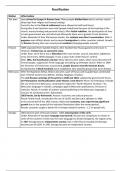Lecture notes
Russification of national minorities under Alexander II and Alexander III
- Module
- Breadth study (1H)
- Institution
- AQA
Russification of national minorities under Alexander II and Alexander III. Covers treatment of the Jews, Ukrainians, Poles, Estonians, Lithuanians, Latvians, Muslims and Georgians.
[Show more]



